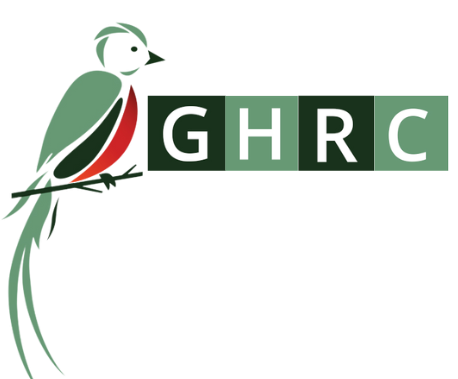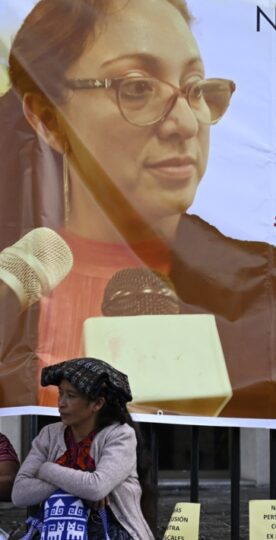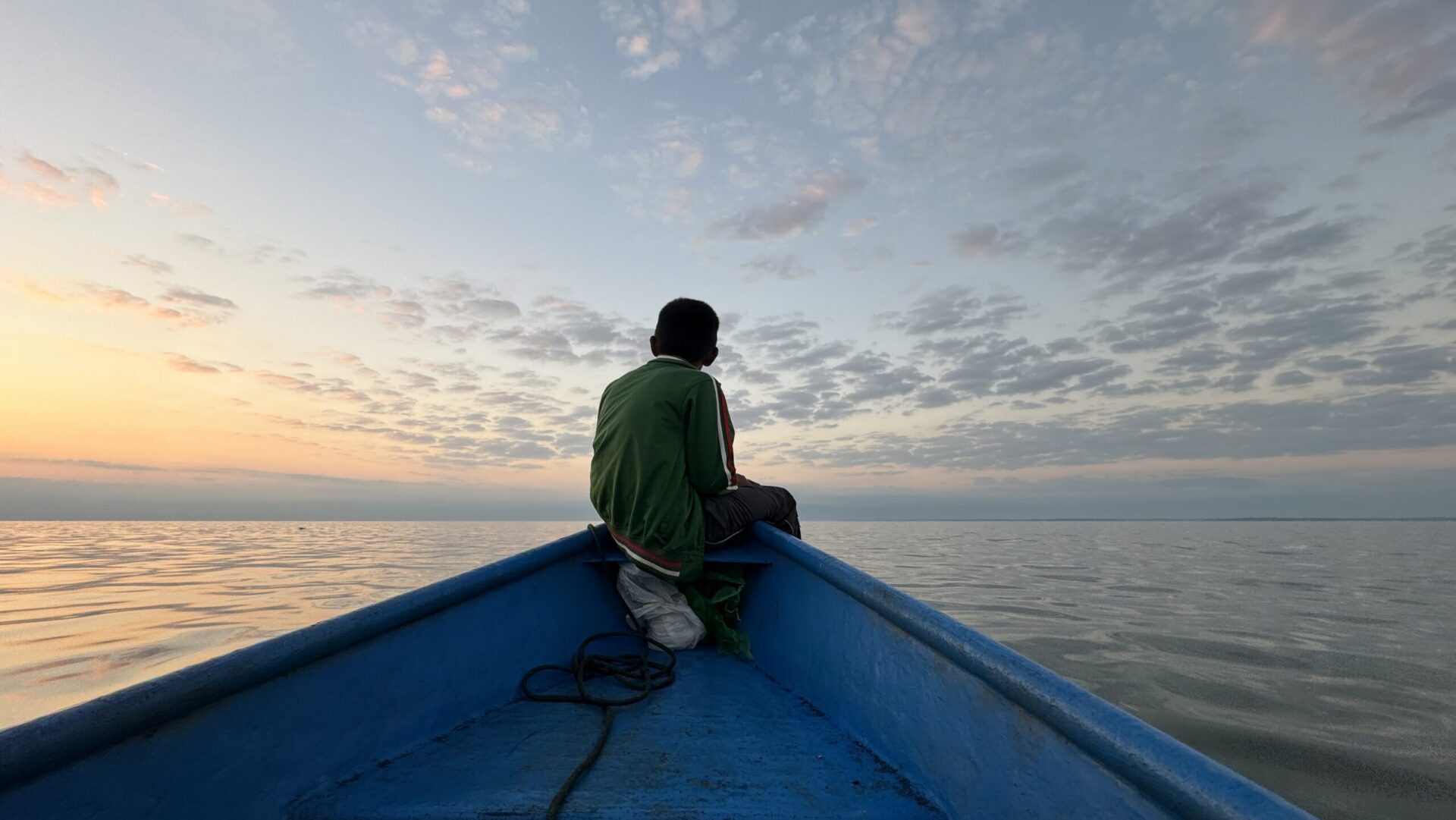Summer has brought celebrations and setbacks to the brave defenders of Guatemalan human rights.
In hopeful news, Indigenous land rights activist Lolita Chávez has returned to her home in the K’iche after seven years of exile. In 2017, she suffered an attempt on her life for her efforts to curtail illegal logging and defend the environment, forcing her to flee to Spain. Notable community leaders, supporters, and President Bernardo Arévalo visited K’iche to celebrate her homecoming on June 28th.
Meanwhile, in the trial of former General Benedicto Lucas Garcia, genocide survivors from Guatemala’s civil war continued to give their testimony, helping to pave the way to a future of greater historic memory and justice.
At the same time, President Arévalo continues to face attacks by the Public Ministry (MP) and Attorney General Consuelo Porras. This is despite overwhelming international condemnation of the attempts by Porras and the MP to overturn Arévalo’s electoral victory in 2023. Porras, along with other officials, has been sanctioned for corruption and undemocratic conduct by over forty countries, including the United States.
Corrupt actors continue to weaponize the justice system to criminalize independent judges, lawyers, anti-corruption prosecutors, and other justice workers. In early July, Virginia Laparra, a well-respected former prosecutor, was sentenced to 5 years of commutable prison, a fine of 50,000 quetzales, and a prohibition barring her from holding public office for ten years. On July 8, the GHRC co-signed a letter condemning this ruling and pledging our continued support to Virginia Laparra.
We continue to stand with Virginia Laparra, and all others who defend the rule of law in Guatemala. In these uncertain times, the upcoming judicial elections have the potential to significantly impact the human rights situation in Guatemala for years to come. We sincerely thank you for your solidarity and support!
Legal Proceedings
- Virginia Laparra Endures Continued Judicial Retaliation for Anti-Corruption Efforts, Culminating in Forced Exile
Virginia Laparra continues to face legal persecution for her work fighting against corruption. The former prosecutor from Quetzaltenango initially faced spurious charges of ‘abuse of authority’ after filing a complaint against Judge Lesther Castellanos Rodas. In December 2022, she was arrested and sentenced to four years in prison in a case widely denounced —including by the United Nations— as arbitrary and inconsistent in basis and condemned as government retaliation against Laparra’s anti-corruption work.
On May 27th, 2024, only a few months after Laparra’s release from house arrest, the Public Ministry slapped the Prosecutor with another unfounded charge, claiming she had leaked confidential information to the press during a 2017 anti-corruption investigation. On June 6, 2024, Laparra was forced to renounce her position as a prosecutor officially, citing the barrage of criminal prosecution that had made it impossible for her to continue.
On July 8, 2024, Laparra was sentenced to five years in prison in a second retaliatory trial, which too received widespread condemnation, most notably by US Assistant Secretary of State Brian A. Nichols and Margaret Satterthwaite, UN Special Rapporteur on Independence of Judges and Lawyers. After the trial’s conclusion on July 18, 2024, Laparra announced she would go into exile to “preserve her life,” adding that the persecution she had suffered was “solely the result of doing my job with independence and maintaining my dignity.” In a show of support, President Bernardo Arévalo posted, “While Virginia finds herself obligated to leave the country, the corrupt walk impunity through the streets. May the strength and honesty of lawyers like Virginia guide the changes the justice system needs.”
- Justice for the Forced Disappearance and Torture of Efraín Bámaca Velásquez Delayed Again
On July 16, 2024, the case against 14 former military officials for the 1992 disappearance and torture of guerilla leader Efraín Bámaca suffered yet another setback. Jennifer Harbury, Bámaca’s wife, was blocked from providing her anticipatory testimony in a Guatemalan courtroom.
As the hearing in High Risk Court “A” began a lawyer from the Public Prosecutor’s office announced that an injunction had been issued in favor of one of the accused, Salvador Eduardo Rubio Parra. The injunction annuls the actions of the Human Rights Prosecutor of the Public Prosecutor’s Office in the Bámaca Velásquez case and prevents any further investigations or legal proceedings.
Presiding judge Claudette Domínguez, voicing frustration with the last-minute notification of the injunction, was compelled to suspend the hearing. Alejandro Axpuac, the plaintiff’s attorney, also voiced his indignation stating “The injunction is fraudulent and illegal, it goes against the sentence of the Inter-American Court of Human Rights.”
Efraín Bámaca, also known as “Comandante Everado,” was a guerrilla fighter who disappeared after a clash with the Guatemalan army in March 1992. The military claimed he died in combat, but the accounts of other captured combatants, as well as declassified US documents, indicate that he was abducted and held under torture for nearly a year and a half before being executed. In 2002, the Inter-American Court ruled in favor of Harbury and ordered the Guatemalan government to investigate and prosecute those responsible for Bámaca’s abduction, torture, and murder.
For the past 32 years, Harbury, a Harvard-trained lawyer, has fought to bring those responsible to justice and the Guatemalan courts have repeatedly hindered these efforts. After it was revealed that Bámaca’s captors and torturers were paid CIA assets, then-President Clinton declassified archives on involvement in Guatemalan war crimes that have now been used in dozens of human rights cases.
In 2000, the Inter-American Court on Human Rights ruled in Harbury’s favor, and in 2006, the Guatemalan State offered a formal apology. Guatemalan courts, however, have failed to prosecute those responsible.
“What happened yesterday in the case after 32 years is very typical, they thwart everything so that impunity continues along with corruption,” Harbury noted.
Judicial corruption in the Guatemalan court system continues to be a major roadblock to pursuing justice and human rights, making upcoming court elections all the more important.
- Genocide Trial of Benedicto Lucas García: Experts Testify to Horrific Levels of Destruction
June 27, 2024, marked 41 days of hearings in the trial of former General Benedicto Lucas García for genocide against indigenous Ixil communities in 1981 and 1982. Hundreds of testimonies from experts and survivors have described massacres, sexual violence, ecological destruction, forced disappearances, and the mass displacement of thousands of families from their ancestral lands.
On June 11th and 12th, experts Eyal Neizman and Paulo Carvalho testified that the ecological destruction carried out by government soldiers constituted an act of cultural genocide intended to erase indigenous ways of life. Neizman, an expert on forensic architecture, said that the label of genocide is appropriate because there was a clear intent by the government to eliminate Ixil ways, considered by the army to be a threat to national security. Carvalho affirmed that the goal of the government soldiers, led by Lucas García, was to erase Ixil culture. The army utilized a scorched earth strategy, burning massive swathes of indigenous Ixil land in the Quiché Department in addition to killings, acts of sexual violence, and razed villages.
- Survivors Recount Atrocities During Testimony in Benedicto Lucas Garcia Trial
On June 18 and 19th, 2024, the court heard the testimony of six Ixil survivors from the village of Ilom in Chajul, Quiché Department. One survivor, María Caba Caba, told the court that her husband had been taken and killed by government soldiers who later set fire to their home. Forcing her and her son to seek refuge in the mountains and survive on herbs for the next five years.
A witness to the crime, José Iztep, a resident of the nearby village of Xix, reported that he, too, fled into the mountains after massacres in his town and the surrounding areas, where he survived for three years.
Witness Juan Cruz told the court that government soldiers killed his wife and two children.
Witness Tiburcio Utuy recalled the displacement of at least 1,900 families from several local villages to the mountains. Caba Caba, Asicona, and Cruz identified the attackers as government soldiers based on their camouflage uniforms and because they spoke Spanish instead of any Mayan language.
On June 20, 2024, the court heard the testimony of two more survivors from the village of Jauventau in Chajul municipality. Witness María Gómez reported that soldiers killed several community members in addition to burning their houses, crops, and livestock. They killed her son and committed acts of sexual violence. Witness Sebastián Saquij reported that he, along with other members of the community, were forced by army soldiers to go with them to an army base, where several of them were killed.
Human Rights Defenders
- Indigenous Activist Lolita Chávez Returns from Exile, Calling for an End to the Persecution of Human Rights Defenders
Mayan feminist, human rights defender, and community activist Lolita Chávez returned to Guatemala on June 28 after seven years of exile in Spain. She was forced to leave in 2017 following an assassination attempt for her activism against deforestation in the Quiché Department. In an event attended by activists and President Bernardo Arévalo, she called on the government to increase protections for human rights defenders and to facilitate the return of those in exile. Lolita also insisted on the need to protect Indigenous communal lands and end evictions, saying, “Wherever I walked, I carried with me a dream of returning to this sacred land.”
Chávez has advocated extensively against government mining permits issued without the consultation of local K’iche communities, as well as deforestation and evictions from indigenous lands. The 2017 assassination attempt, the sixth attempt on her life, was carried out by men associated with a logging company engaged in illegal deforestation. In 2013, Lolita was hosted by the Guatemala Human Rights Commission in Washington, D.C., during a speaking tour of the United States and Canada.
- UN Denounces Arbitrary Detention of Journalist José Rubén Zamora
The United Nations Working Group on Arbitrary Detention ruled on July 2, 2024, that Guatemalan journalist José Rubén Zamora is being held arbitrarily in prison. Zamora is the founder and editor of the El Periódico newspaper. Throughout his thirty-year career, he has reported extensively on corruption and the links between government officials and organized crime.
In July of 2022, Zamora was arrested on money laundering charges, a move many saw as an act of retaliation by the government of then-President Alejandro Giammattei. Zamora had been reporting extensively on corruption in the Giammattei administration. The arrest was widely condemned within Guatemala and internationally. The UN group’s statement asserts that Zamora’s arrest “was the result of the legitimate exercise of the right to freedom of expression.”
A week earlier, an appeals judge revoked a lower court’s ruling that would have allowed Zamora house arrest. That move drew condemnation from US Assistant Secretary of State Brian Nichols, who called it “another example of unacceptable threats against press freedom from the court [and] the Public Ministry.”
Governance
- OAS Observers Scrutinize Judicial Elections, Attempting to Counter Powerful Forces of Corruption
On June 24, a Special Observation Mission of the Organization of American States (OAS) began observing Guatemala’s judicial electoral process. The three experts are academics and lawyers from across Latin America with experience in human rights and judicial independence. They will report any obstacles to participation or acts of corruption during the electoral process. The Mission has opened a communication channel with private institutions, civil society organizations, and citizens so that they can present any information that might be relevant to the Mission’s work. The invitation to the OAS was extended by the government of Guatemala in response to the notorious corruption and lack of transparency in previous judicial elections.
On July 4, legislators swore in the thirty-seven members of the commission that nominate potential judges before they are voted on in the legislature. The commission comprises law professors, representatives of the Commission of Lawyers and Notaries of Guatemala, and sitting judges. The body is presided over by a representative selected among Guatemalan university presidents.
The composition of the new judiciary has the potential to make or break President Arévolo’s democratic reformist agenda, which already faces considerable challenges. In a June speech at the United Nations, Arévalo declared the judicial elections “under siege by criminal networks.”
- Public Ministry Targets Semilla with False Criminal Charges
On June 19, Judge Fredy Orellana accepted a request from the Special Prosecutor’s Office against Impunity (FECI) and authorized the Public Ministry to carry out “a new phase” of the criminal proceedings against the Semilla party.
The request was made by the Public Ministry prosecutor Leonor Morales, who the US State Department affirms has “undermined democratic processes or institutions” through a “politically motivated investigation to cast doubt on certified election results to disrupt the presidential transition.” Judge Orellana has also been listed as a corrupt and undemocratic actor for having “undermined democratic processes or institutions by authorizing unsubstantiated, politically motivated criminal charges.”
On July 2, Judge Orellana extended the provisional suspension of Semilla’s legal status as a political party and froze its assets. The Public Ministry’s continued attempts to sabotage Arévalo’s presidency and the results of his election exemplify the importance of upcoming judicial elections in determining the future of his reform agenda.
August 2nd, 2024




